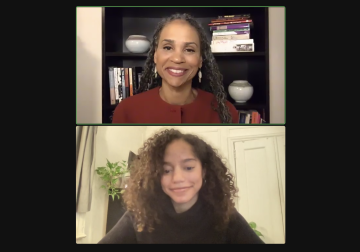Maya Wiley ’89 Delivers Keynote at Seventh Annual Alumni of Color Event
The 2021 candidate for New York City mayor tells students and alumni to speak Martin Luther King Jr.’s “unarmed truth.”
Maya Wiley ’89 knows the significance of a Columbia Law School degree, and “it’s not the paper.
“It’s the leadership. It’s the analytic skills. It’s the advocacy, activism, the strategy, and the critical thinking, and the thinking about society,” she said. That’s “the most important thing to recognize about the law degree.”
Wiley, a 2021 candidate for New York City mayor, former legal commentator for MSNBC, and former NAACP Legal Defense and Educational Fund (LDF) lawyer, spoke to members of the Law School community at the seventh annual Alumni of Color event, held virtually on January 20.
In her introduction, Gillian Lester, Dean and Lucy G. Moses Professor of Law, said Wiley “has public service in her DNA. . . . We are bursting with pride that she’s a Columbian.”
Wiley contrasted two recent events: the holiday honoring Martin Luther King Jr. and Congress’s failure to pass legislation protecting “something as fundamental as voting rights,” even as opponents invoked King’s name.
She quoted King’s 1964 Nobel Peace Prize acceptance speech: “I believe that unarmed truth and unconditional love will have the final word” against oppression and violence.
“We, in this past period of our democracy, have seen neither. . . . I don’t think there’s any time that has ever been more critical for us as lawyers to step in in every way we can,” she said. “We are in dark times. And the light will not come quickly. But it will come, and it will come because we believe it will, and we dedicate ourselves to shining it.”
For lawyers, Wiley said, that means being a force for good and opposing those who are otherwise. She contrasted the harmful legacy of discredited lawyers, such as former New York City Mayor Rudy Giuliani, with the efforts of lawyers who have served the public good, whether through nonprofit work or at law firms. She praised Columbia Law School alumnae who are embodying King’s message, including marriage equality advocate Bobbie Wilson ’90 of Perkins Coie, Cathy Albisa ’89 of Race Forward, Adriene Holder ’91 of The Legal Aid Society, and newly appointed New York City Deputy Mayors Anne Williams-Isom ’91 and Sheena Wright ’94.
Mentoring the Next Generation of Lawyers
Wiley was joined by Olivia Martinez ’23, chair of the Black Law Students Association, for a conversation about careers and the challenges of entering the field as a lawyer of color. “Be driven by your passion. Be driven by what you want to seek to do and what you want—for lack of a better word—your legacy to be. And the legacy isn’t about a single job,” Wiley said. For example, Wiley said she had never planned to leave her job at the LDF. But when offered a position with the U.S. attorney for the Southern District of New York, to work with Mary Jo White ’74 and Jane Booth ’76, Wiley said she took the role because, “I wanted to know that I was the best litigator I could be. . . . It was an opportunity to do just that: to improve my craft in a place that still did civil rights enforcement.”
The lesson, she said: “Being open to opportunities to do what will serve the passion that may not have been in the plan.”
Wiley empathized with students who will experience the difficulty, and marginalization, of being the only person of color, or only woman, in a professional setting—for instance, her experience of appearing in court and having a judge assume she was a defendant, not a lawyer. She navigated those experiences in two ways: “One…I had to be better. And I knew and understood I had to be better. And I knew and understood it was unfair. It wasn’t right. It was just true,” she said. “But the other thing is, I refused to be silent about it.”
Even in law school, Wiley didn’t hesitate to challenge professors when a class discussion involving race made her feel as if she’d “been hit in the face with a two-by-four,” she said.
If “you’re going to make me feel uncomfortable and treat it like it’s just neutral and natural, I’m going to make you feel it, too,” she said. “That was my unarmed truth. And I brought it to class.”
Now, as she looks forward, Wiley is taking her own advice and staying open to opportunities. She doesn’t intend to run for office again, she said, but she knows never to say never. “For me, it’s always about where and how can I utilize my skills to serve my passion? My passion is equality, is democracy, and is ending poverty. And I think all those three things actually go together, and they cannot be done separately. So where I can best do that is where I will do it.”
The annual Alumni of Color event celebrates the leadership and accomplishments of Columbia Law School’s alumni of color. The first event, in 2015, coincided with the launch of the Eric H. Holder Jr. ’76 Scholarship Fund, which supports law students of color. Today, the fund is valued at more than $900,000, and the second scholarship recipient is to be named in spring 2022.
